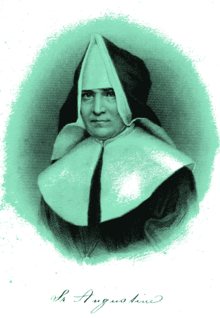Amalie from Lasaulx
Amalie von Lasaulx , also Amalie von Lassaulx , (born October 19, 1815 in Koblenz , † January 28, 1872 in Vallendar ) was a nun of the Sisters of Mercy ( Borromean Sisters ) and superior of the Johanneshospital in Bonn .
Life
Amalie von Lasaulx was born on October 19, 1815 in Koblenz as the daughter of the architect Johann Claudius von Lassaulx . In 1840 she joined the Order of the Sisters of Mercy (Borromean Sisters) and took the name "Sister Augustine". From 1849 she worked as superior of the Johanneshospital in Bonn. During the wars of 1864 and 1866, she cared for the wounded in field hospitals in Schleswig and Bohemia .
When the First Vatican Council proclaimed the dogma of the Pope's infallibility in questions of faith and morals in 1870 , she considered this to be incompatible with her Catholic spirituality . In her opposition she knew she was strengthened by the majority of professors in the Catholic Theological Faculty of the University of Bonn, in particular Bernhard Josef Hilgers , Franz Heinrich Reusch and Joseph Langen , with whom she was in lively intellectual exchange. Since she did not hold back with her attitude and always referred to her conscience and the hope for a "better future of the Catholic Church", she was deposed as superior of the Johanneshospital in November 1871 and, herself already sick, was transferred to a House brought to Vallendar. When she steadfastly refused to accept the new dogma, she was denied reception of the sacraments . The priest A. Hochstein, who professed the old Catholic faith , secretly brought her the sacraments . She died on January 28, 1872. After her death, on the orders of the General Superior , the dress of the order was symbolically removed and the body was brought under degrading circumstances in a boat without any accompaniment by nuns, priests or relatives to the other side of the Rhine to Weißenthurm , where she was in Parents grave should be buried. Friends hastily called together, including doctors, the rendant and servants of the hospital, as well as the old Catholic members of the Bonn theological faculty, gave her the last escort .
effect
Amalie von Lasaulx rejected the papal dogma of 1870 because it ran counter to her Christ-oriented spirituality that the Pope had himself proclaimed Lord of the Church in such a way. Through her active charity and her steadfastness, which could neither break threats nor reprisals, she became a witness at the beginning of the old Catholic movement in Germany.
literature
- Anonyma (Christine Freiin von Hoiningen-Huene): Memories of Amalie von Lasaulx . Gotha 1878.
- Christine von Hoiningen-Huene: Memories of Amalie von Lasaulx, Sister Augustine, Superior of the Barmh. Sisters in the St. Johannishospital in Bonn: with d. Portr. d. Sister Augustine . 3rd edition Perthes, Gotha 1881 ( digitized version )
- Joseph Hubert Reinkens : Amalie von Lasaulx. A confessor . 3rd edition, Bonn 1881.
- Church for Christians Today . H. Hoffmann Verlag, Berlin 1994, ISBN 3-87344-001-6 , p. 99f.
- Edith Ennen: Amalie von Lasaulx. In: Biographisch-Bibliographisches Kirchenlexikon (BBKL). Volume 4, Bautz, Herzberg 1992, ISBN 3-88309-038-7 , Sp. 1182-1184.
- Joseph Hubert Reinkens : Lasaulx, Amalie von . In: Allgemeine Deutsche Biographie (ADB). Volume 17, Duncker & Humblot, Leipzig 1883, pp. 721-728.
| personal data | |
|---|---|
| SURNAME | Lasaulx, Amalie of |
| ALTERNATIVE NAMES | Lassaulx, Amalie von; Sister Augustine |
| BRIEF DESCRIPTION | Religious sister and supporter of the Old Catholic Church |
| DATE OF BIRTH | October 19, 1815 |
| PLACE OF BIRTH | Koblenz |
| DATE OF DEATH | January 28, 1872 |
| Place of death | Vallendar |

